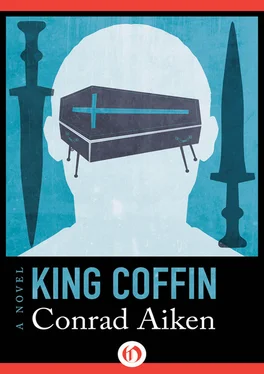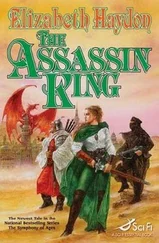At the back entrance of Houghton and Dutton’s, a truck was being unloaded. A heavy crate fell from the tailboard to the sidewalk with a sharp clap, a pistol shot of sound, and the sound was at once echoed by the simultaneous slapping of a hundred pigeon wings as the startled birds took whistling flight from the sooty window ledges of the Court House. Round the Square they circled, and vanished northward at the far end of the Court House, his eye following them out of sight; and in that instant the tweed hat had vanished also, turning to the left at the top of the hill. No need to worry — he would still be there — but he quickened his pace, glanced hurriedly over the crowded array of second-hand books in the window of the Rebuilt Bookshop, noting one title, Erring Yet Noble , and presently, keeping close to the window of the Waldorf, turned the corner and looked down toward Beacon Street. The little man had disappeared: he was not there.
Impossible!
But yes, of course, possible.
He must be either in the Waldorf, at his left elbow, or in the shoe-shine parlor beyond: the Waldorf, at this hour, seemed improbable, but to inspect the interior through the large windows was simplicity itself. And sure enough, the tweed hat was standing at the counter, was in the act of receiving a heavy china mug of coffee, came forward with it, stepping cautiously, sat down at a table without once having raised his eyes, dipped sugar from the sugar bowl and began stirring the cup with a spoon.
A retreat, and a wait, becoming necessary, Ammen bought an American from the newsboy at the corner, crossed the street, stood with lifted paper by the door of the Newsboy Foundation. PICKETERS HELD IN CONTEMPT. Holy Year O. K.’d by Pope. NAZI SPY GANG IS UNCOVERED. Bootleggers, dope peddlers, and other racketeers, driven into temporary retirement by repeal and other causes, are back of the Boston welfare swindle, it was charged today. Mother Faber, a tiny slip of a woman, today stood in humbled pride on the witness stand.… The question now is whether the state trial should have proceeded, with habeas corpus proceedings pending in federal court. Fliers Hop for Rome Tomorrow.
The wind whirled the pages, the paper flapped against his arm in its effort to escape, a tall spiral of dust went spinning past the City Club. For a moment the sun flashed downward, filled the dull streets, sparkled on the cars, then was again dimmed by heavy clouds. He looked upward, watched the clouds in swift procession, ragged and gray, but not rain clouds, it would not rain. From Park Street Church came, with clamorous loudness, immediate and strange, the eight bells of the half hour, windborne and irregular. Half past nine.
The whole thing was peculiar: he had started a good fox, and no mistake. Perhaps he had no job at all, was going nowhere. Either out of work, or of independent means. But surely not the latter?
Picketers and racketeers.
Or of course he might be an “outside man” for some firm or other, whose hours were more or less his own—
This time, when the little man reappeared, it was with a new air of purpose and a noticeable quickening of pace. In a few minutes he had reached Beacon Street, Ammen keeping fifty feet behind; and then suddenly the hat had turned left into a narrow doorway which appeared to lead into a barbershop. Hurrying forward, Ammen found that it was not in fact the barbershop, but the entrance to a flight of shabby marble stairs which led to the upper floors: business offices of the humbler sort. Listening, he could hear the footsteps climbing above, and at once, taking three steps at a time, and without making a sound, he followed. The hall on the second floor was vacant: ground glass doors of an insurance office, a dealer in real estate: the footsteps were again ascending, and as he reached the bottom of the second flight of stairs he saw the feet just arriving at the floor above. They disappeared, he could hear them slowing, then a jingle of keys, the turning of a lock, the opening of a door. The door must be the one immediately opposite the stairhead. He waited a moment, listened, heard the door close, and mounted swiftly. Behind the gray glass he could see the moving shadow of a man in the act of removing his coat, very close at hand. The stenciled letters on the door said: Acme Advertising Agency. K. N. Jones and T. Farrow.
Jones! If only it was Jones!
And why not?
He knocked his pipe softly against the yellow-plaster wall, dislodged the light crust of ash, began to laugh. That it should turn out to be a Jones would be almost too good to be true. The anonymous one, the abstract one, the mere Specimen Man — it would be perfect! But even if it turned out to be Farrow—
Walking forward to the front window, he looked down into School Street, ticked the black pipestem against his teeth, reflected with narrowed and unseeing eyes. The thing was beginning; he was in the presence of it; his shadow was already falling upon the tree, like an immense frost of peril; and even as he stood here, in the shabby hallway, unknown to the tweed hat which now hung on its peg, his powerful influence was beginning to expand and penetrate. He had entered the stranger’s little world, he was here inside it, learning its shape and size, taking possession of it. This worn wooden floor, the scarred plaster of the walls, the ground glass of the old-fashioned doors, the gas bracket in the corner — this was the stranger’s domain, known to his feet and hands and eyes, returned to day after day, dreamed about, hated, loved. The whole little life was beginning to lie open, like a familiar book.
Opening the window, he leaned out; and at once something caught his eye. The telegraph office. His long hands tightened on the edge of the sill, — the idea was sudden, and like a pair of claws. It was as simple as lightning. And it would be as effective.
Two minutes later, in the telegraph office, he wrote Gerta’s telephone number on a yellow telegraph form, added “please call after 11,” and sealed it in an envelope. On the envelope he printed with the pencil the name “K. N. Jones.”
— I want a messenger, please, right away.
— Yes, sir, for how long—
— I want him to come with me and deliver this note at the foot of School Street, while I wait outside for an answer. It will take him five minutes.
— Yes, sir, that will be—
— Give me the change from this.
Outside the barbershop, he handed the yellow envelope to the boy and explained.
— Just take this in and deliver it to Mr. Jones — or if Mr. Jones isn’t there, to Mr. Farrow. The third floor. I want you to notice what the man you give it to looks like. That’s all. Then come down and tell me, and I’ll give you a dollar. Have you got it?
— Yes, sir.
— All right, beat it. And make it quick.
Within a minute, the boy was back, grinning.
— I gave it to Mr. Jones, all right! And was he surprised! He asked me where it come from, but of course I didn’t say a word.
— What did he look like?
— Oh, one of these little guys, with a kind of a Charlie Chaplin mustache, and sort of bald.
— Was there anybody else there?
— No, sir.
— All right — here’s your dollar. And keep it under your hat.
— Sure thing. Thanks. Say, are you a detective?
— Yes. And by the way, what’s your name?
— Costello, sir. Peter Costello.
— I might need you again sometime. Now beat it, and forget it — see?
— Sure.
Clouds and a wind, the wild heavens opened and closed with wild light, the morning had deepened immeasurably, was deepening with each breath he drew: what a surprise was in store for Gerta, what a surprise was in store for Jones, what a surprise was in store for God! With his hand clenched tight in his pocket he held an imaginary revolver, he was already climbing the hill among the cedars to his particular place, the little hollow among birches and junipers, he was already taking aim at the rock, and now, rapidly and repeatedly, he pulled the fatally compliant trigger. Mr. K. N. Jones, of the Acme Advertising Agency, was as good as dead.
Читать дальше












